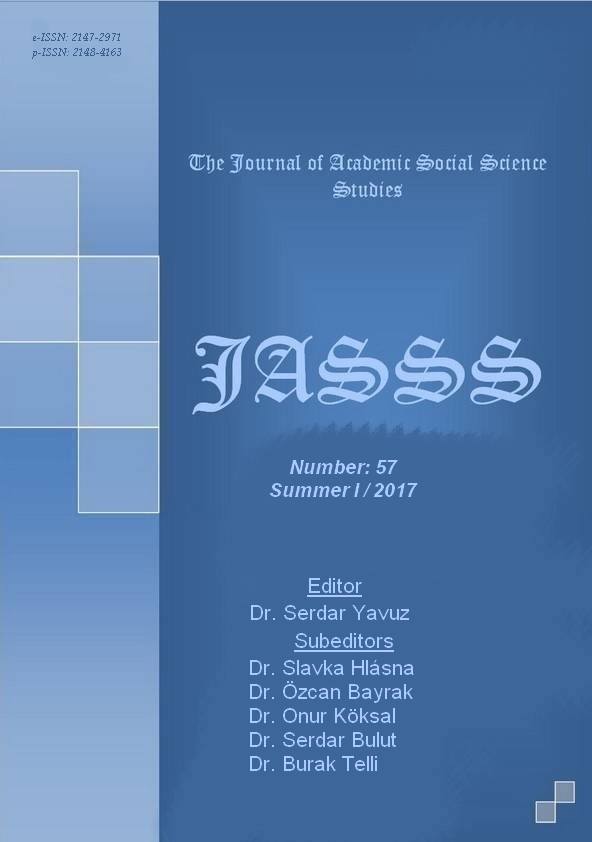Author :
Abstract
Bu çalışmanın amacı, Osmanlı iktisat düşüncesinde girişimcilik kavramını Ahmet Midhat Efendi’nin girişimcilik düşüncesi ve bizzat gerçekleştirdiği iktisadi girişimleri üzerinden ortaya koymaktır. Osmanlı klasik iktisadi sisteminin çözüldüğü, kapitalist sisteme entegre olduğu bir süreci, Ahmet Midhat Efendi ve girişimcilik kavramı üzerinden betimlemektir. Girişimci; kâr sağlamak amacıyla emek, sermaye ve doğal kaynakları bir araya getirerek bir işletme kuran, bu işletmeyi yöneten ve yaptığı işin riskini üstlenen kişidir. İktisadi girişimcilik “geleneksel girişimcilik” ve “kapitalist girişimcilik” olmak üzere ikiye ayrılmaktadır. Kapitalist girişimci, sermayenin sınırsız birikimini geçerli tek yasa kabul eden kişidir. Modern dünya, kapitalist girişimcinin öncülüğünde şekillenirken Osmanlı, bu dönüşüme ayak uyduramamış ve 1938 Baltalimanı Antlaşması’yla birlikte kapitalist sisteme eklemlenmiştir. Baltalimanı Antlaşmasından sonra Osmanlı iktisadi yapısı hem geleneksel hem de kapitalist bir karakter sergilediği gibi bu dönemin bir aydını ve girişimcisi olan Ahmet Midhat Efendi’de de bu düalist karakteri görmek mümkündür. Ahmet Midhat Efendi; pek çok gazete ve dergi çıkararak yayıncılık girişimlerinde bulunmuş, aynı zamanda matbaacılık yapmıştır. Bugün de hâlâ tüketiciye sunulmakta olan Sırmakeş suyunun isim babası ve bu suyu piyasaya sunan ilk kişidir. Ayrıca Beykoz’da kurduğu modern çiftlik işletmesi de Osmanlı’da ilk kuluçka makinesinin, modern arı kovanının kullanıldığı, pek çok aşının denendiği bir çiftliktir. Ahmet Midhat Efendi, gerek girişimcilik düşüncesiyle gerekse de öncülük ettiği iktisadi girişimleriyle, bir anlamda Türkiye’nin son iki yüzyıldaki serencamının prototipidir.
Keywords
Abstract
The purpose of this thesis is to present the concept of entrepreneurship in Ottoman economic thought through an analysis of Ahmet Midhat Efendi’s understanding of entrepreneurship, and his own economic enterprises. I will employ Ahmet Midhat Efendi and his concept of entrepreneurship to describe the process through which the classical economic system of the Ottoman Empire dissolved and got integrated into capitalist world system. An entrepreneur is someone who establishes and runs a business firm by bringing labour, capital and natural sources together with a view to making a profit, and who takes the risk of such an enterprise. There are two forms of economic entrepreneurship: traditional and capitalist. Capitalist entrepreneur is someone who acknowledges the unlimited accumulation of capital as the sole valid law. Ottoman Empire failed to keep up with the transformation of the world in the modern era, which was a transformation whose motor force was the capitalist entrepreneurship. Because of this failure, Ottoman Empire had to integrate her economy into capitalist world system with the Treaty of Baltalimanı (1838). Post-Baltalimani Ottoman economic scene reveals characteristics both of traditional and capitalist entrepreneurships, and the co-existence of these two models is visible in Ahmet Midhat Efendi who was a contemporary intellectual and entrepreneur. Ahmet Midhat Efendi was a printer, and started several newspapers and periodicals. Besides, he is the first to offer bottled water to the market and founder of Sırmakeş Bottled Water Company, which survived to this day with the same name. The modern farm that he founded in Beykoz is the first farm in Ottoman territory to try and to use incubators, modern beehives, and scions. Ahmet Midhat Efendi is in a sense the prototype of the two centuries long adventure of Turkey through both his understanding of entrepreneurship and his own economic enterprises.





